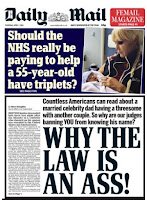The leaker of the Panama Papers, who approached German newspaper Suddeutsche Zeitung: "Hello this is John Doe interested in data? There are a couple of conditions. My life is in danger. We will only chat over encrypted files. No meeting, ever. The choice of story is obviously up to you. I want to make these crimes public."
The International Consortium of Investigative Journalism on the Panama Papers leak exposing how the rich and powerful hide their wealth offshore: "The cache of 11.5 million records shows how a global industry of law firms and big banks sells financial secrecy to politicians, fraudsters and drug traffickers as well as billionaires, celebrities and sports stars. These are among the findings of a year long investigation by the International Consortium of Investigative Journalists, German newspaper Süddeutsche Zeitung and more than 100 other news organisations."
Michelle Stanistreet, NUJ general secretary: "The current proposals contained within the investigatory powers bill justify the state surveillance of journalists and represent a significant threat to press freedom in the UK. The Panama papers clearly show the importance of protecting journalistic communications and sources from state surveillance. We are urgently calling on all politicians to take action and amend the legislation to safeguard press freedom in the UK."
The Daily Mail: "British justice descended into farce last night after the identity of a celebrity who cheated on his spouse was revealed in the United States but blocked here. The pair have been named in an American print publication reporting on the infidelity.But a draconian privacy injunction means Britons are barred from learning in the media who the well-known couple are."
Jacob Rees-Mogg in the Sun on Sunday: "A free press is more important than the peccadillos of a celebrity. It is the high pressure hose that cleans the sewers of public life and has made the United Kingdom one of the least corrupt countries in the world. It is not the job of the media to report boring public interest stories but to sell their wares. Trying to establish a particular public interest is a fool’s errand, for the permanent censorship of the truth is almost never beneficial."
Mike Gilson editor of The Argus, Brighton, in a comment article in his paper: "The [local newspaper] industry is going through huge transformation at present but I’m not really talking about these seismic changes, I’m talking about a state of mind. For there is much that seems supine about some journalism at present...Journalists are outsiders. The safeguards that govern democracy demands it be thus. Show me an editor who wines and dines regularly with the powerful, or with whom they are on constant speed dial and I’ll show you someone who doesn’t really understand the job."
Simon Jenkins in the Guardian: "Few serious papers make money. Most depend on a tacit non-aggression pact between profit, philanthropy and proprietorial lust for glory. This treaty may seem dodgy, but it has held in Britain for the best part of a century. I see no reason why it should collapse. People will always crave trustworthy information on the world around them. They will pay for it – someone will pay for it – somehow or other. The press may die one day, but not yet I think. I worry far more about democracy."
Roy Greenslade in the Guardian: "If newspaper advertising, the lifeblood of British journalism for the best part of 200 years, is not to dry up completely, publishers must find new ways to convince advertisers that they have audiences worth targeting. And quickly."
Peter Preston in the Observer: "The Mail isn’t the world’s top newspaper online because of its diplomatic coverage. Flaunted curves and celeb hook-ups do that job."
Stuart Prebble in the Guardian on ex-World in Action editor Ray Fitzwalter who died this week: “The word ‘legendary’ is over-used in television, but Ray Fitzwalter truly was a legendary figure. In his time as editor of World in Action he presided over the team of producers and researchers like Robespierre over the French revolution. He was the scourge of the corrupt wherever they were to be found, and an advocate of old-fashioned ‘sleeves rolled up’ investigative journalism to uproot it.”
John Illman in the British Journalism Review on the number of ex-Mail journalists, like himself, who joined the Guardian: "She [Polly Toynbee] reduced a morning conference to silence by declaring that no one who had been on the Mail should be allowed to work for The Guardian."















No comments:
Post a Comment